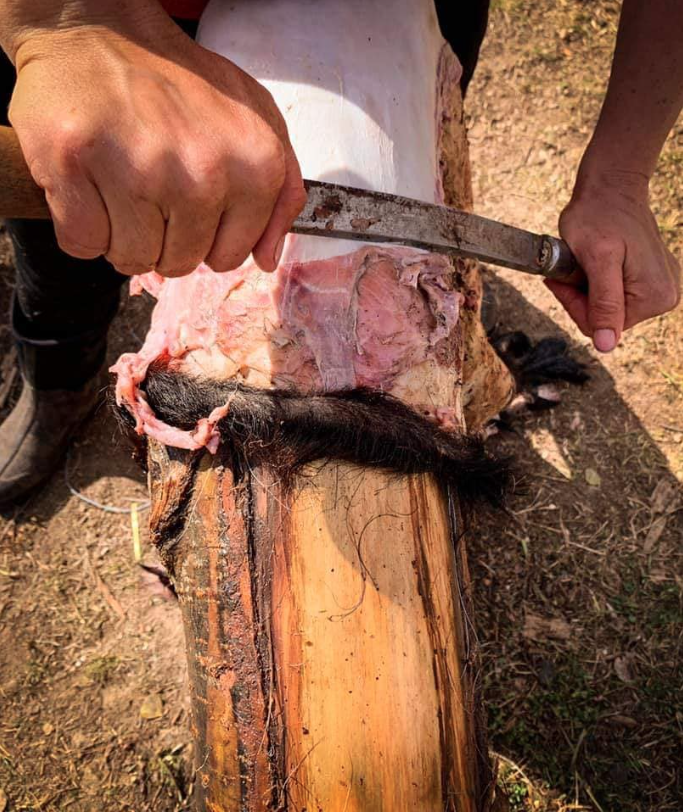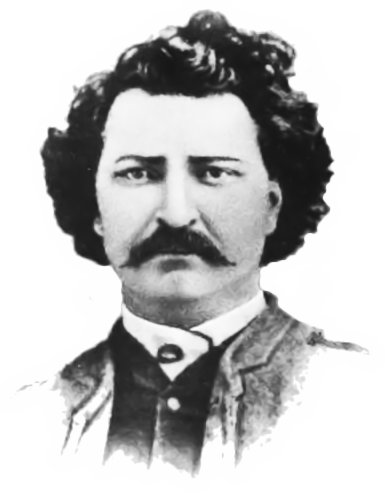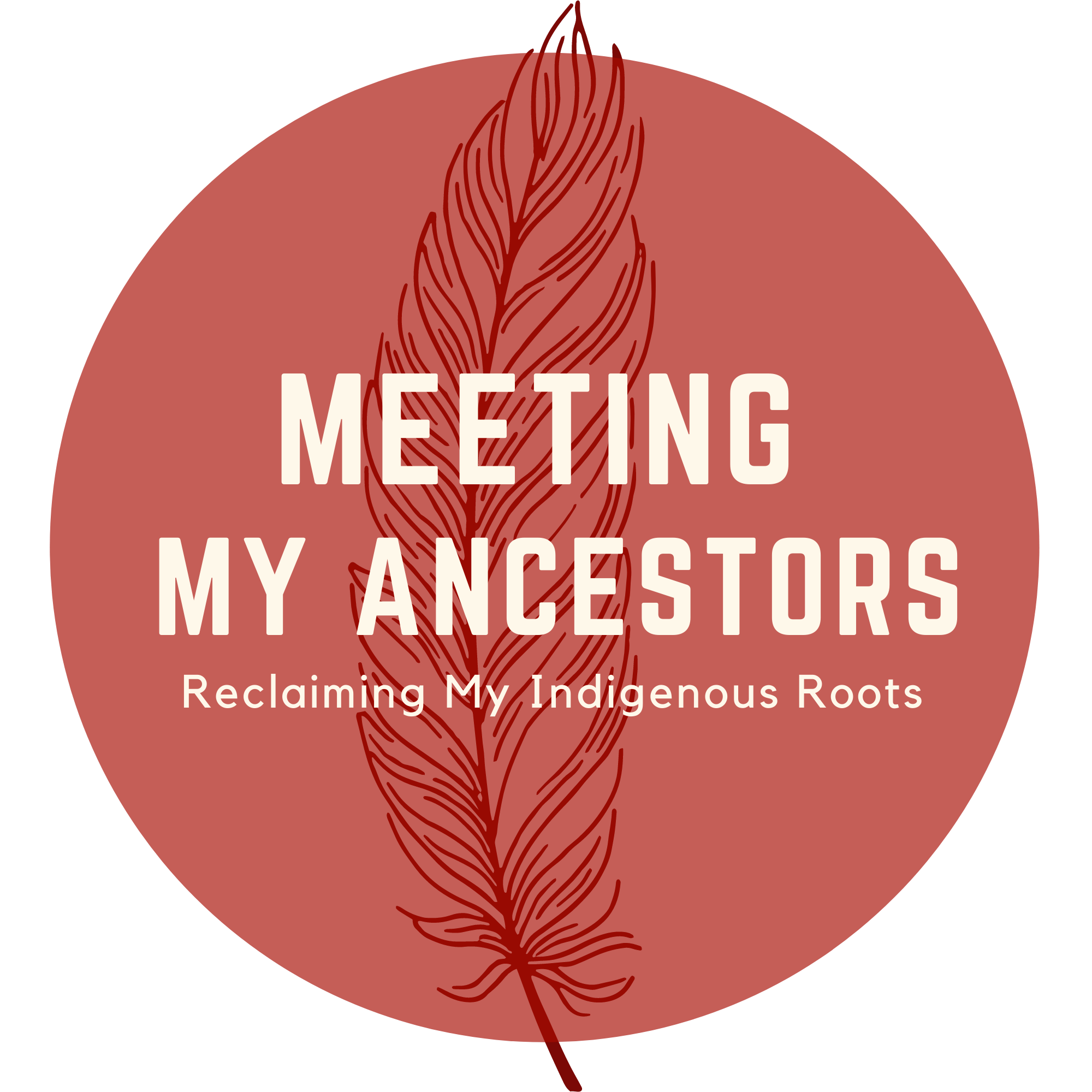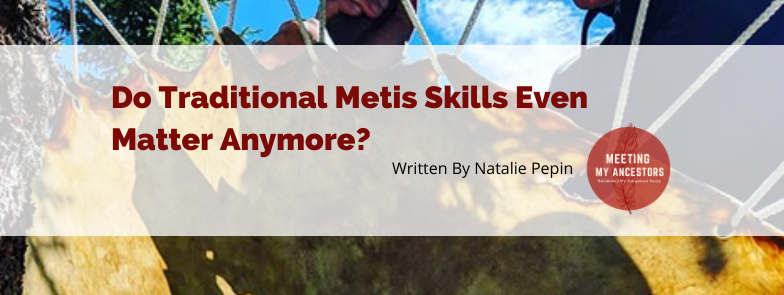
I remember asking one of my groups of students who came to learn how to brain tan hides “why bother learning this skill?…Most people, even our from within our nations, don’t want this. It’s hard work. Why do you want this?”
I warned them of the challenges of learning to tan hides. This skills comes with incredible demands.
“You back will ache, your arms may shake, you will sweat, your knuckles will likely be sore…and in these times, remember, this is the legacy of our women…hard work, community, and survival. No wonder we had iron kohkums.”
Our skills hold important lessons about where we come from and the character of our ancestors. They give us a glimpse into the past.
But why does it matter if we connect with our culture? Why should we even want to meet our ancestors?
We live in modern days. We have conveniences that our ancestors could never have imagined. We have central heating, running water, large homes (lets face it, even apartments are large by historical standards), and we can travel quickly, learn anything we want, lets face it…there are some pretty amazing foods out there from every culture on the planet…just waiting for us to enjoy them.
Modern technologies are clearly making advances in our world. Computers have given us so much. We can’t deny that. During these pandemic times, computers and the internet have allowed us to stay connected to each other. Video’s and audio recordings have allowed us to preserve and reclaim our language, Michif.
With all that modern technology has given us, why bother reaching back into the past?
Our culture is about so much more than simply the homes we live in and the ways we communicate.
Our Culture Is A Rich Environmental Knowledge Base
“Long before the development of modern science, which is quite young, indigenous peoples have developed their ways of knowing how to survive and also of ideas about meanings, purposes and values. It has become customary to refer to this kind of knowledge as “indigenous knowledge” or “traditional knowledge.”
Ole Henrik Magga https://archive.ifla.org/IV/ifla71/papers/183e-Magga.pdf
Our culture holds the connection between us and our environment. For hundreds of years, and from our first nations ancestors for thousands of years before that, we have accumulated a rich knowledge base about the land we live on.
“Indigenous communities have devised distinctive methods of encoding useful data within philosophies of thought and modes of activity that are linked to particular landscapes. This data includes geographical, genealogical, biological, and other evidence that maps human relations to flora and fauna, land and water, and supernatural forces.”
Margaret M. Bruchac https://repository.upenn.edu/cgi/viewcontent.cgi?article=1172&context=anthro_papers
This place, our homeland, has cared for us for generations. Over the course of those generations, we have learned how to flourish here, how to live in a way that doesn’t deplete and destroy the environment but rather cares for it in turn.
The pollution, decimation of our lands, and near extinction of so many species that we have shared this land with, requires that we remember how to live here in a restorative and respectful way.
Our culture holds the keys to healing the land.
Our Culture Is A Source Of Discipline And Hard Work
Like the effort and exertion of brain tanning a hide, many aspects of our culture are physically demanding and require a deep resolve discipline to complete a task.

Our culture ensured we understood the importance of our efforts and the important role we each held in our community.
In our modern day, strong cultural ties is the greatest predictor of academic success for indigenous students. (H. Colleen Marchant, Indigenous Ways of Learning, Being and Teaching: Implications for New Teachers to First Nations Schools, 2002) https://dspace.library.uvic.ca/bitstream/handle/1828/1929/CMarchant2009h.pdf?isAllowed=y&sequence=3
Because of this, schools have placed great emphasis on incorporating culture into curriculum and studies.
Our traditional culture helped each member of our community find a place of importance and value. It stressed community ties and working together. That we are all connected, and are important to the survival of one another. Developing ourselves through education and career, and bringing the gifts of these back to our communities, is a part of the ethic of our culture.
Our culture promotes success for the individual, and the community.
Indigenous Arts Are Traditional Skills That Allow For Our Cultural And Spiritual Expression

“My people will sleep for one hundred years, but when they awake, it will be the artists who give them their spirit back.”
Louis Riel (July 4th 1885)
Traditional skills and specifically indigenous arts a common gateway through which our people seek to reconnect with their culture. And it’s no wonder. These are the aspects of our culture that, even when we were despised by the society that overtook our homes, were admired and seen as valuable. When we were forbidden from expressing our traditional culture and ways, beadwork, moccasins, tufting and quill work were still allowed and even allowed our women to support their families economically. Absent a full cultural connection, these arts became a spiritual expression.

Skills such as beading, quill work, embroidery, moccasin making, working with birch bark, finger weaving, leatherwork, tanning hides, and so so much more, are a place for us to connect with our culture.
It is these same arts that continue to be recognized by members of our community who institutions, broken families, residential schools, and shame have stolen away from us, as a safe place to begin to reconnect to this culture which holds such value.
I see this every time I welcome new students into our beading, moccasin making and other traditional indigenous arts classes. With uncertainty, and not being fully clear on how learning these skills will help them on their journey to reclaim their culture, they come. Hoping to learn who their ancestors were and who they are.
Their fingers follow the same steps as our old ones. And they begin to experience a share cultural memory. Though they may not have ever done these things before, it feels right, there is a remembrance.
These skills are a place for stories, teachings, and community. These skills developed out of our connection to place, to tradition and to each other. They embody our way of life and values.
The Beauty Of Our Arts Is A Safe Place To Reconnect And Reclaim
Sharing culture and traditional skills is historically the job of parents, grandparents on ones immediate community. The legacy of colonization has left few families with these skills intact in their everyday lives, and at times, there are few left within the community who can share these skills.
So if these skills are so vital for personal, academic, and spiritual health, and they are no longer the foundation upon which households are built, the work of preserving them through cultural outreach becomes critical.
This work is so important in fact that the United Nations arm responsible for culture and heritage (UNESCO) has stated that “traditional craftsmanship is perhaps the most tangible manifestation of intangible cultural heritage.” and highlights that “safeguarding attempts should -concentrate on encouraging artisans to continue to produce craft and to pass their skills and knowledge onto others, particularly within their own communities.” – https://ich.unesco.org/en/traditional-craftsmanship-00057
Traditional Skills Teach Us The Stories Of Our Women
Traditional skills and arts are in a very real way, a large part of the story of the women of our nation that is so often forgotten and left out. Their daily activities were filled with these skills, and it is practicing these skills that helps us remember them and their pivotal role in the development of our culture and our nation.
Natalie Pepin – Traditional Skills Instructor with Meeting My Ancestors
Learning these traditional skills reconnects us to the mothers of our nation. It shows us who they were, their values, their character, and the love they held for their families.
Traditional skills and indigenous arts are the nexus of reclaiming our culture and meeting our ancestors, especially our kohkums.
Why reclaim and reconnect to our culture through traditional skills and arts?
Relearning our skills and our traditional art forms allows us opportunities in our modern lives to learn the stories, values, and teachings of our ancestors. These aspects of our culture place us into the story of our people, give us a strong sense of self, and meaning in our lives. Beyond these personal blessings that our culture brings, a strong connection to our culture helps us understand and protect our environment, helps our students succeed in school and take on roles of importance in our communities, and helps us remember the stories of our women so we can once again remember the respect and value of women in our society.
My Invitation To You
Our traditional skills are important, so so very important, in keeping our culture alive. I invite you to join so many of our people in reclaiming our heritage by learning our traditional skills. Learn how to stitch moccasins, how to bead and create an octopus bag, how to stitch a capote, and how to create a moss bag to welcome our babies. Tan hides, alone or in community. Feel a connection to the past through these things.
As you gain these skills, even if you are my no means an expert, share them. Come together in your community and share these skills. And if you are far removed from our traditional communities, and our homeland, learn these skills within your own home. Practice them. And pass them on to your children and grandchildren.
As you do, I know that you will feel a connection to our culture and our ancestors like I have, and like so many from our nation have.
Join a proud and important heritage, along wth those who came before us, as stewards of these traditional skills…as stewards of our culture.

